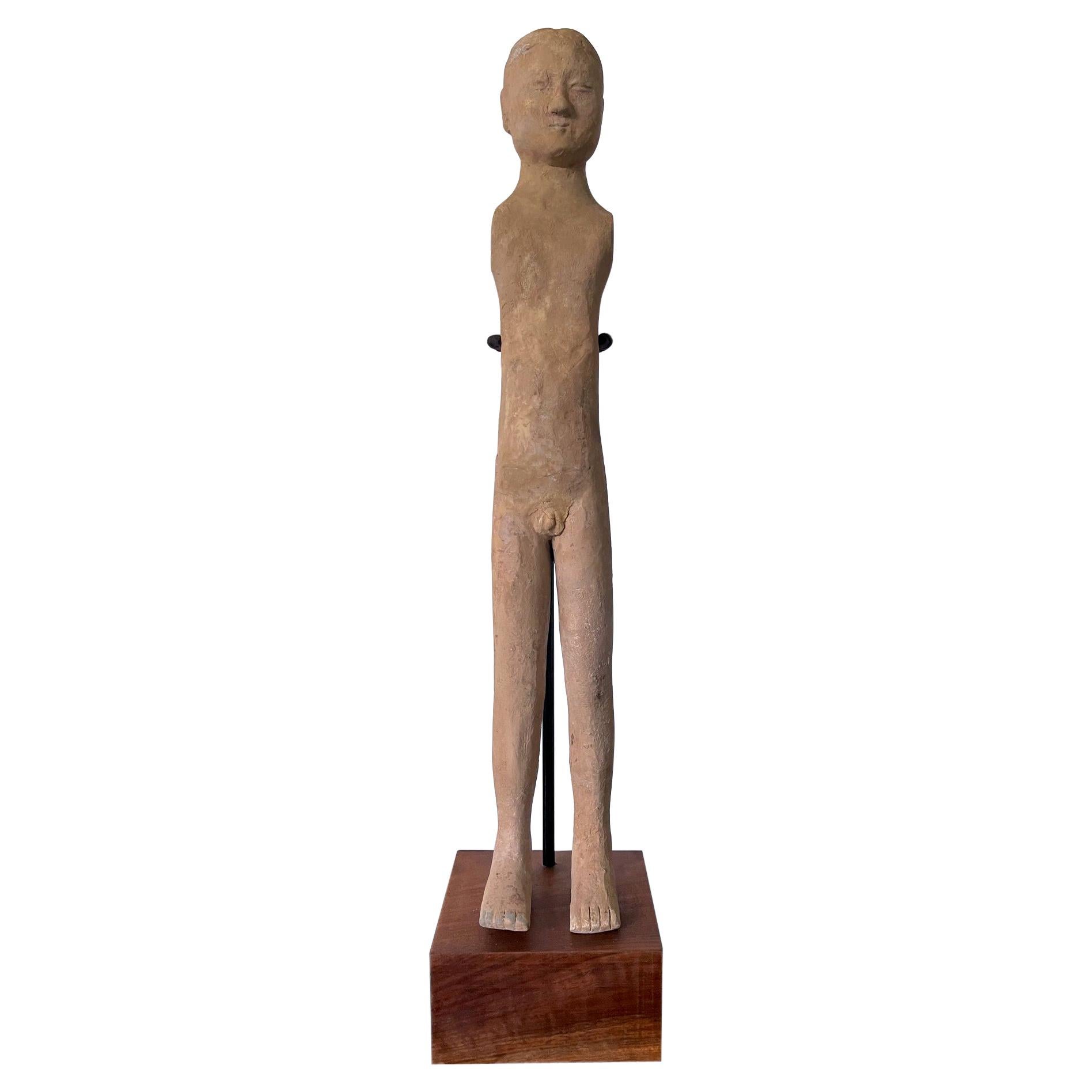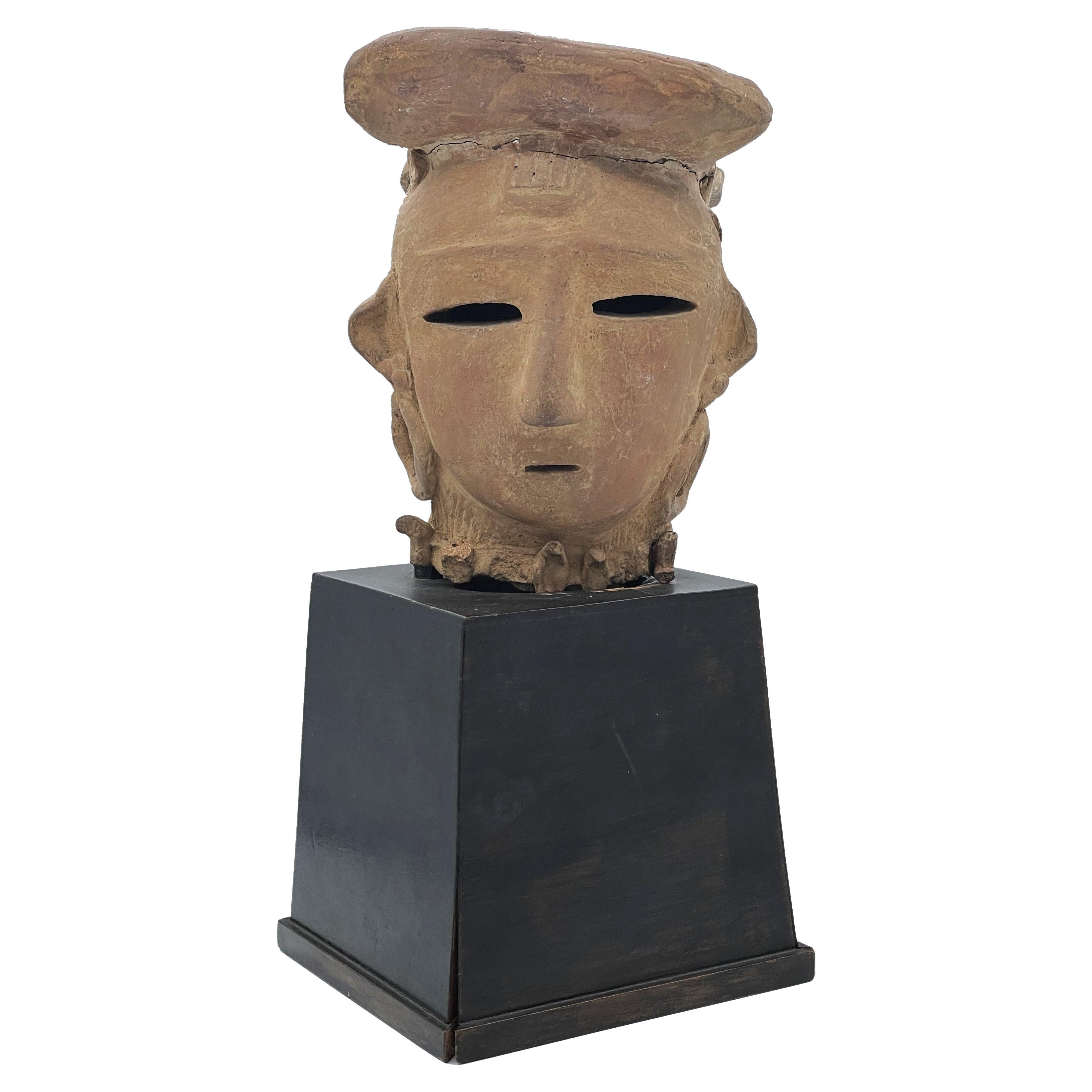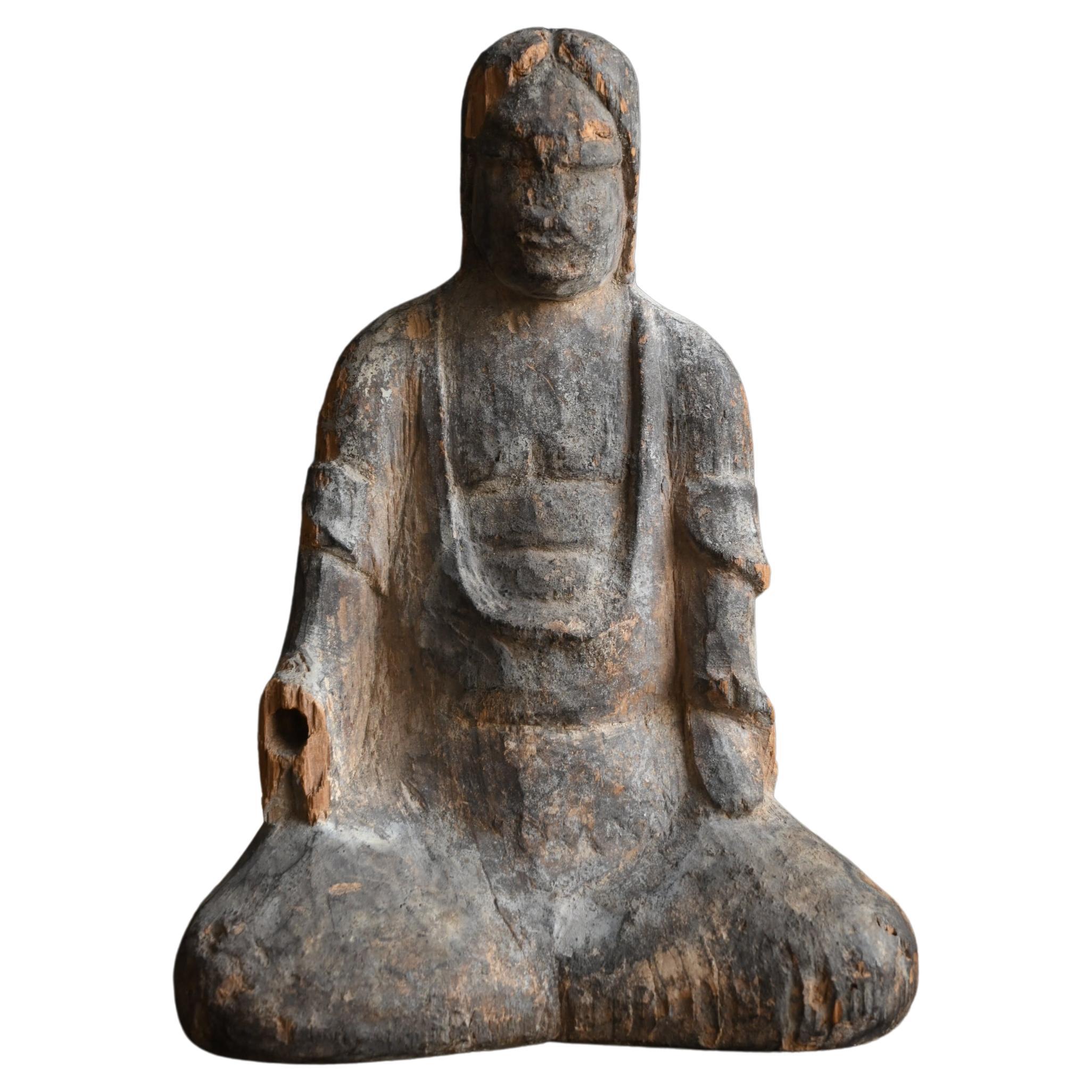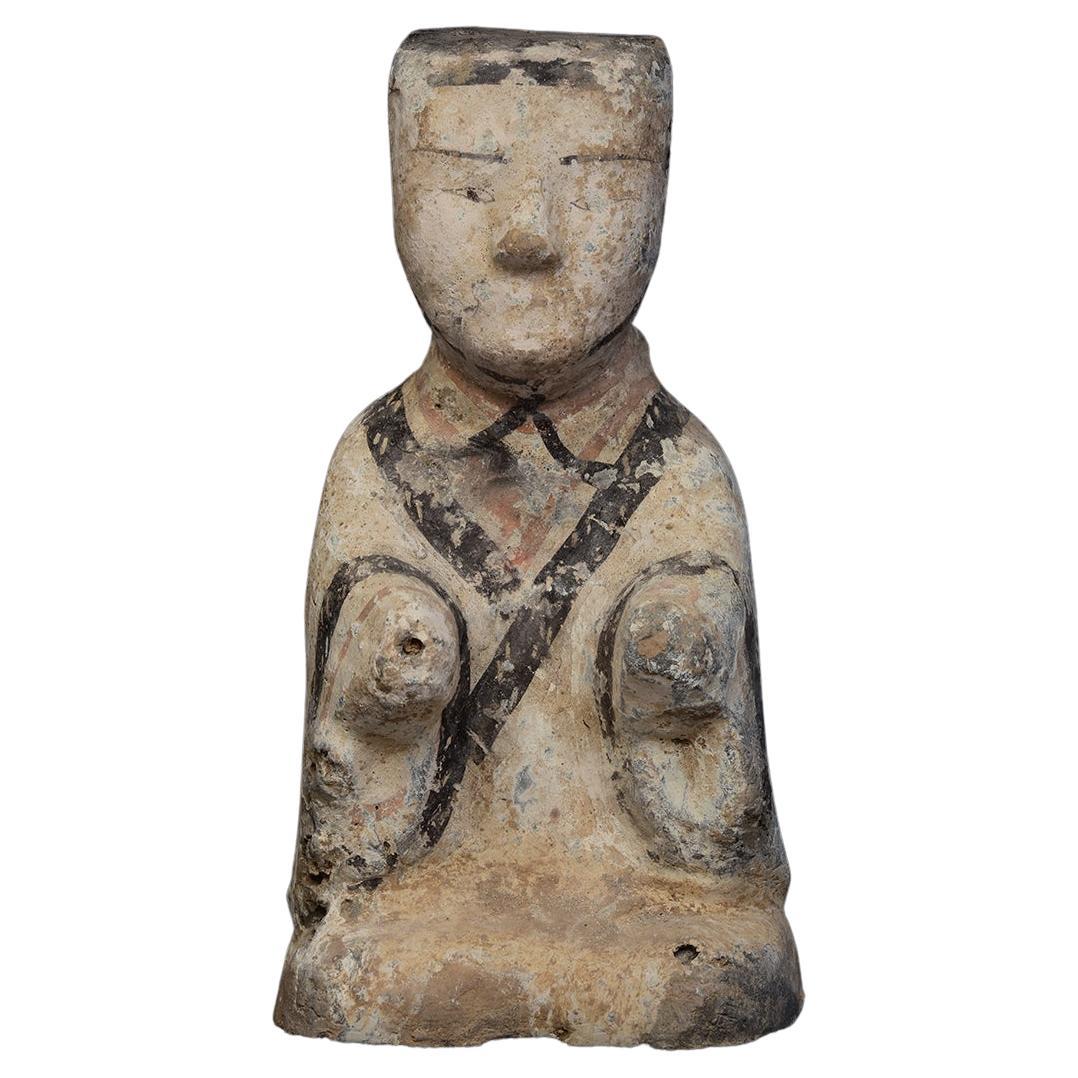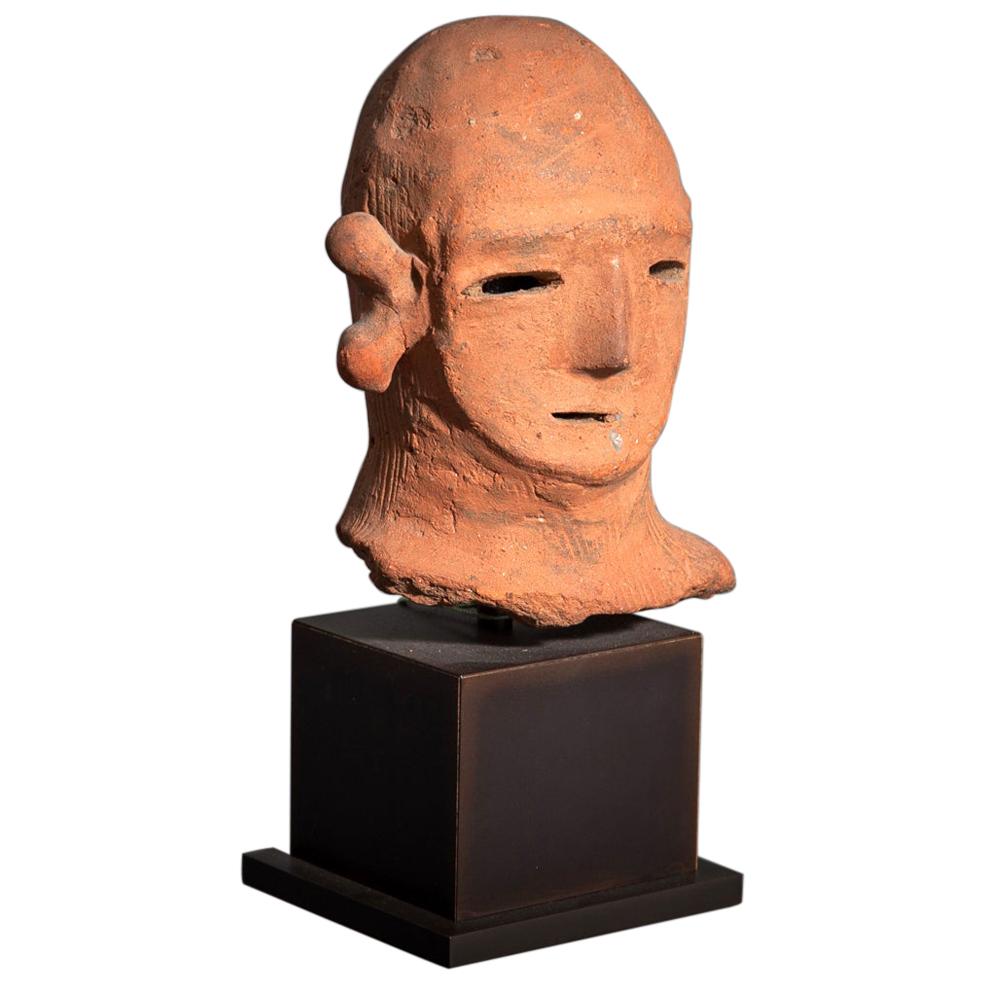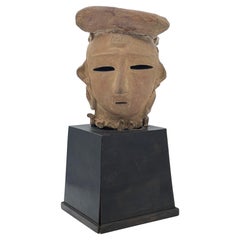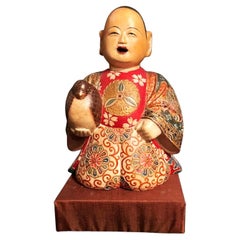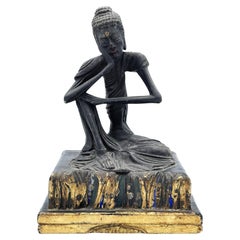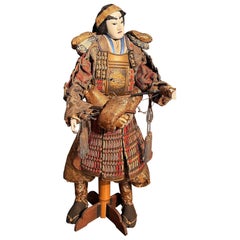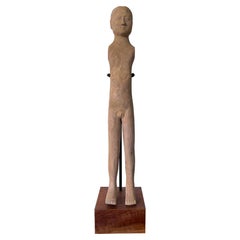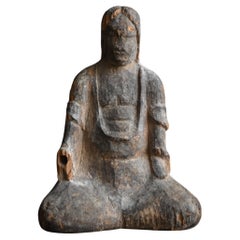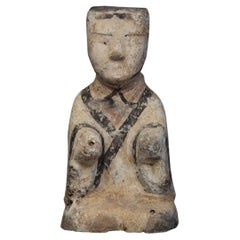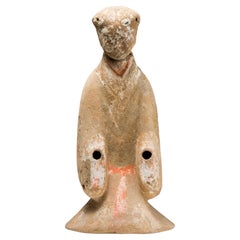Items Similar to Rare Japanese Complete Figure of an Aristocratic Woman Haniwa, 6th Century AD
Want more images or videos?
Request additional images or videos from the seller
1 of 8
Rare Japanese Complete Figure of an Aristocratic Woman Haniwa, 6th Century AD
$3,500
£2,645.57
€3,040.23
CA$4,873.73
A$5,421.82
CHF 2,842.19
MX$66,253.36
NOK 36,191.71
SEK 34,069.49
DKK 22,694.13
Shipping
Retrieving quote...The 1stDibs Promise:
Authenticity Guarantee,
Money-Back Guarantee,
24-Hour Cancellation
About the Item
Rare Japanese Complete Figure of an Aristocratic Woman Haniwa, 6th Century AD
DIMENSIONS
Height: 8.5 inches
Width: 6 inches
Depth: 4 inches (base)
ABOUNT
A remarkably well-preserved and rare example of an early Japanese haniwa sculpture, this complete terracotta figure represents an aristocratic woman and dates to the 6th century AD, during the Kofun period (ca. 250–538 AD). Haniwa—cylindrical clay figures placed on and around burial mounds—served ritual and protective functions, believed to act as spiritual guardians of the deceased. This finely modeled figure stands out for its completeness and detailed depiction, including the elegant posture, distinctive hairstyle, and stylized ceremonial attire—hallmarks of high-ranking individuals from the era. The figure’s serene expression and simplified yet expressive form embody the sculptural conventions of the time, conveying both dignity and spiritual presence. Figures of aristocratic women are among the rarer types of haniwa, particularly in such intact condition. This piece offers not only aesthetic value but also significant insight into early Japanese funerary practices and social hierarchy.
- Dimensions:Height: 8.5 in (21.59 cm)Width: 6 in (15.24 cm)Depth: 4 in (10.16 cm)
- Style:Japonisme (Of the Period)
- Materials and Techniques:
- Place of Origin:
- Period:
- Date of Manufacture:Ca. 6th Century AD
- Condition:Wear consistent with age and use. We make our best effort to provide a fair and descriptive condition report. Please examine photos attentively, as they are part of the description. Send us a message to request more details or discuss price.
- Seller Location:New York, NY
- Reference Number:1stDibs: LU2819345288982
About the Seller
5.0
Vetted Professional Seller
Every seller passes strict standards for authenticity and reliability
Established in 1993
1stDibs seller since 2017
83 sales on 1stDibs
Typical response time: 7 hours
- ShippingRetrieving quote...Shipping from: New York, NY
- Return Policy
Authenticity Guarantee
In the unlikely event there’s an issue with an item’s authenticity, contact us within 1 year for a full refund. DetailsMoney-Back Guarantee
If your item is not as described, is damaged in transit, or does not arrive, contact us within 7 days for a full refund. Details24-Hour Cancellation
You have a 24-hour grace period in which to reconsider your purchase, with no questions asked.Vetted Professional Sellers
Our world-class sellers must adhere to strict standards for service and quality, maintaining the integrity of our listings.Price-Match Guarantee
If you find that a seller listed the same item for a lower price elsewhere, we’ll match it.Trusted Global Delivery
Our best-in-class carrier network provides specialized shipping options worldwide, including custom delivery.More From This Seller
View AllJapanese Tumulus Period Unglazed Terracotta Haniwa of a Woman’s Head, 3rd/4th C.
Located in New York, NY
Japanese Tumulus Period Unglazed Aged Terracotta Haniwa of a Woman’s Head, 3rd/4th Century
Tumulus Period (AD 250-552)
Haniwa means “circle o...
Category
Antique 15th Century and Earlier Japanese Japonisme Figurative Sculptures
Materials
Terracotta
Japanese Edo Period Saga Ningyo, Ca. 1850
Located in New York, NY
Japanese Edo Period Saga Ningyo, Ca. 1850
DIMENSIONS
Height: 9.5 inches
Width: 6 inches
Depth: 5 inches
Category
Antique 1850s Japanese Japonisme Figurative Sculptures
Materials
Wood
Japanese Edo Period Carved Seated Fasting Buddha, 18th C./Early 19th C.
Located in New York, NY
Japanese Edo Period Carved Seated Fasting Buddha, 18th C./Early 19th C.
DIMENSIONS
Height: 9.5 inches (24 cm)
Width: 7 inches (18 cm)
Depth: 5 inches (12.8 cm)
ABOUT
This early Edo...
Category
Antique Late 18th Century Japanese Japonisme Figurative Sculptures
Materials
Wood
Japanese Meiji Period Elaborate Bunraku Puppeta, 19th Century
Located in New York, NY
Japanese Meiji Period Elaborate Bunraku Puppeta. 19th Century
Meiji Period (1868-1912)
Minor wear to textiles, fine antique condition,
Original Bamboo display stand.
DIMENSION
Height: 33 inches
Width: 18 inches
Depth: 9 inches
ABOUT
Bunraku (puppet) depicting the warrior Minamoto Yoshistune his head carved of wood and covered in a fine white gofun with painted details, face of a handsome youth with trigger mechanism allowing for the eyebrows to raise and lower and the eyes to shift from side, is wearing military armor with signature dragon on his breastplate ,brocade patterning of his thick obi tie, sumptuous silk brocade kimono and brocade hakama trousers with the Minamoto Clan pattern, silk tabi socks...
Category
Antique Mid-19th Century Japanese Japonisme Figurative Sculptures
Materials
Wood
Indian Carved Wood of Shakti Goddess, Ca. 8th to 12th Century
Located in New York, NY
Indian Medieval Carved Wood Sculpture of Shakti Goddess
Ca. 8th to 12th Century
...
Category
Antique 15th Century and Earlier Indian Anglo-Indian Figurative Sculptures
Materials
Wood
Japanese Edo Period Dragon God Ningyô, Ca. 1820
Located in New York, NY
Japanese Edo Period Dragon God Ningyô, Ca. 1820
DIMENSIONS
Height: 26 inches over all
Minor wear in textiles.
Fine antique condition
ABOUT
Musha-Ningyô (warr...
Category
Antique 1820s Japanese Japonisme Figurative Sculptures
Materials
Wood
You May Also Like
Chinese Stoneware Tomb Figure Han Dynasty
Located in Atlanta, GA
A Chinese molded stoneware figure on a custom display stand likely from Han Dynasty (202BC-220AD). These pottery figures were used as part of tomb accouterment for the burial practic...
Category
Antique 15th Century and Earlier Chinese Archaistic Ceramics
Materials
Stoneware
Rare Japanese antique wooden god statue /12th century/small wabi-sabi figurines
Located in Sammu-shi, Chiba
I was able to obtain a very rare item.
This is a sculpture of the god ``Shinzo''.
"Shin" = God
"zo" = statue
Since ancient times in Japan, it has been believed that gods reside in all things in the universe, and there have been many shrines.
In the 6th century, Buddhism was introduced and gradually spread throughout Japan.
Around the 8th century, the idea that gods follow the teachings of Buddha spread.
Until the Edo period, God and Buddha became one and the idea of ``Shinto and Buddhism syncretism'' was established.
This statue was created during such a history.
Originally, the image of God was invisible and could not be understood as something tangible.
However, with the introduction of Buddhism to Japan, idol worship was also introduced, and the idea that the gods follow the teachings of Buddha was also propagated at the same time in order to spread the teachings of Buddhism.
Around that time, around the 9th century, the first statues of gods...
Category
Antique 15th Century and Earlier Japanese Other Figurative Sculptures
Materials
Cypress
Han Dynasty, Antique Chinese Pottery Attendant Figurine
Located in Sampantawong, TH
Chinese pottery attendant figurine.
Age: China, Han Dynasty, 206 B.C. - A.D. 220
Size: Height 22 C.M. / Width 12 C.M.
Condition: Well-preserved old burial condition overall.
100% s...
Category
Antique 15th Century and Earlier Chinese Antiquities
Materials
Pottery
$1,800 Sale Price
20% Off
Large Pottery Standing Figure of Attendant, Han dynasty
Located in seoul, KR
The statuette shows traces of the original red, black, and white pigmentation. The figure’s body, head, and hands (which in this case are lost) were all made separately to give her an essence of movement and dynamism. Given its almost identical shape to the piece from the Artemis Gallery...
Category
Antique 15th Century and Earlier Hong Kong Han Antiquities
Materials
Pottery
$2,334 Sale Price
34% Off
Japanese Haniwa Terracotta Head of a Warrior
Located in Hudson, NY
Japanese Haniwa terracotta head of a warrior, Haniwa figures are Japanese terracotta funerary figures that accompanied the dead buried in early Japan, ...
Category
Antique 15th Century and Earlier Japanese Antiquities
Materials
Terracotta
Early Shinto Carving of Figure Referred to as Father Japan
Located in Hudson, NY
Shinto carving of figure referred to as Father Japan. Heian period (794 to 1185) sculpture made of hinoki wood in single piece construction called ichiboku...
Category
Antique 15th Century and Earlier Japanese Sculptures and Carvings
Materials
Wood
More Ways To Browse
Japanese Stone Art
Asian Women
6th Century
Terracotta Figural
Antique Japanese Stone
Asian Woman Sculpture
Japanese Terracotta
Japanese Clay Figures
Japanese Haniwa
Gu Fang
Han Dynasty Cocoon
Jade Dragon Bowl
Northern Qi Dynasty
Pottery Dog Han Dynasty
Schist Buddha
Tibetan Prayer Wheel
Wei Horse
Antique Pig Figurine
